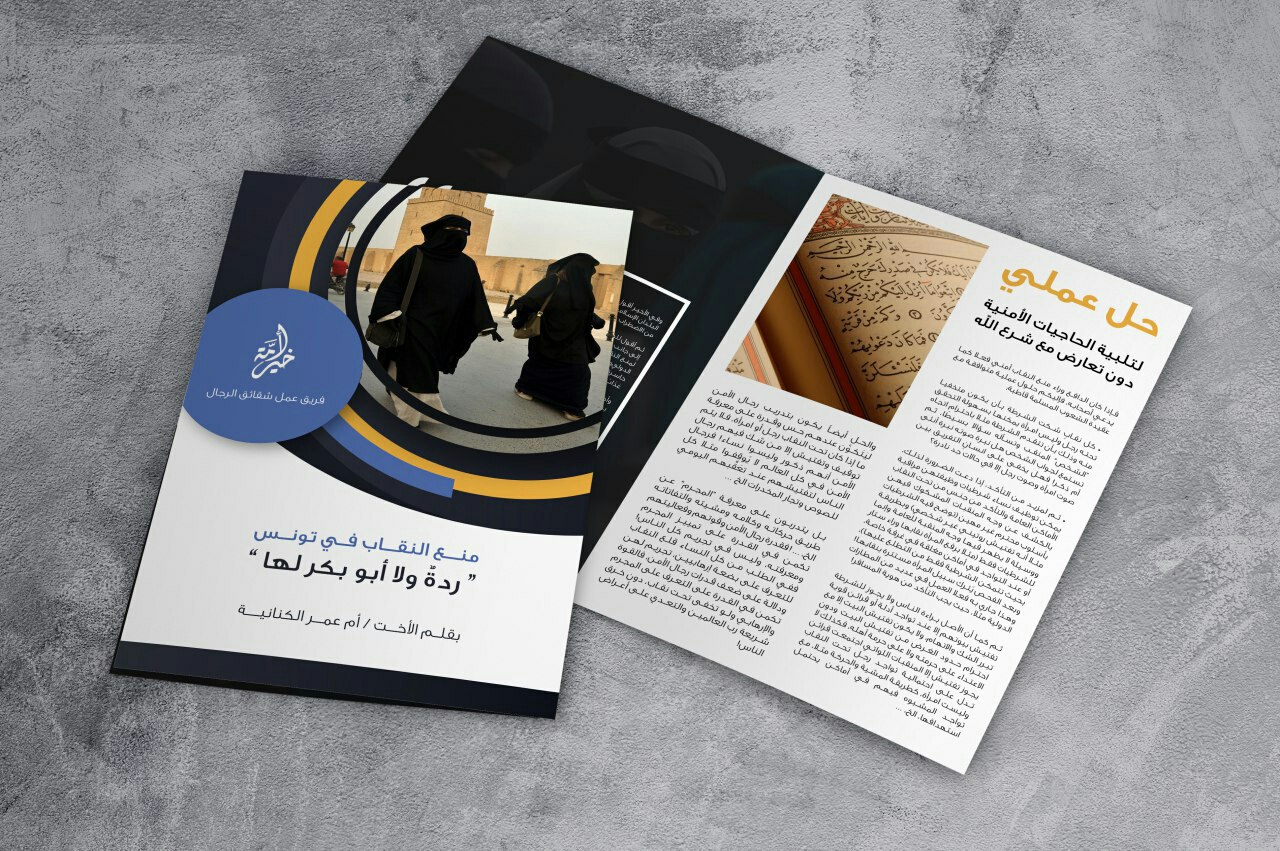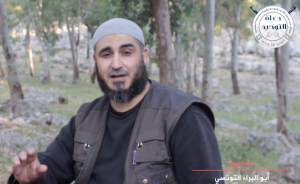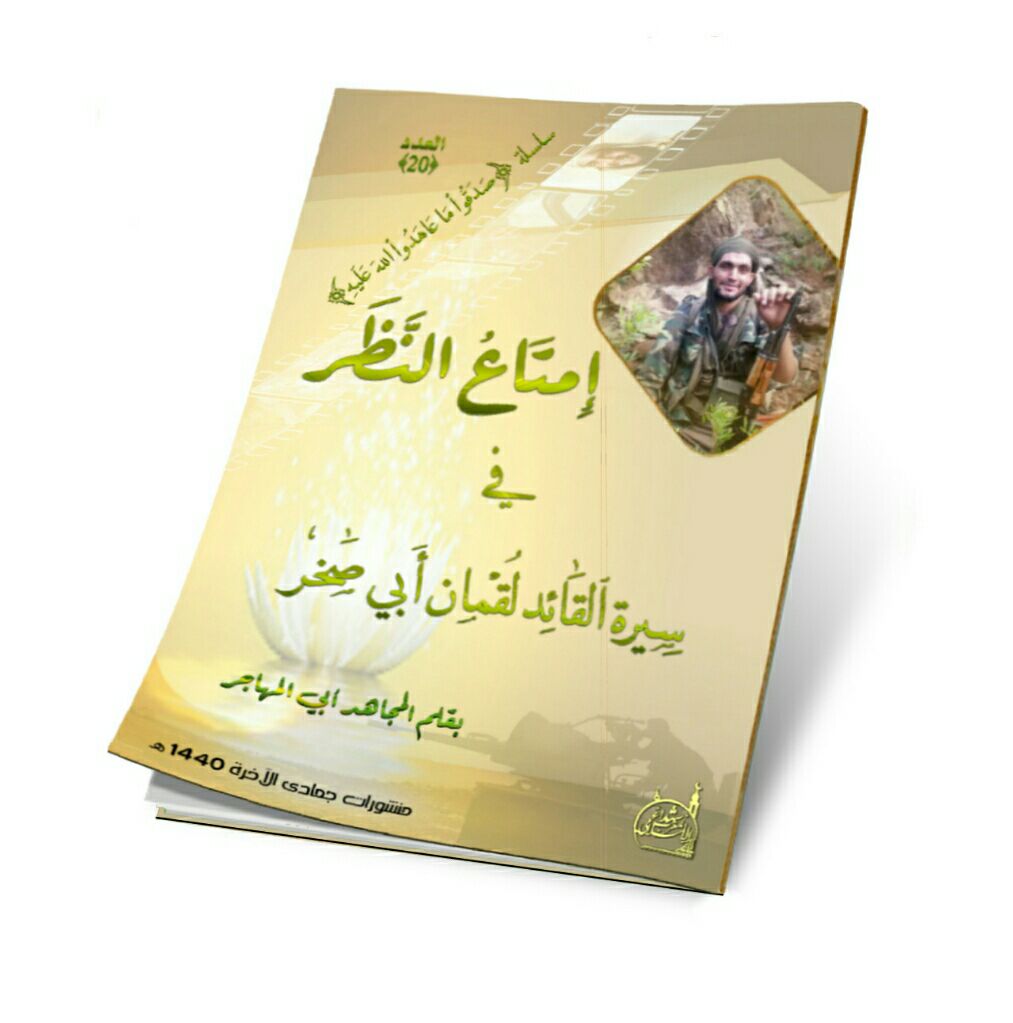
Click the following link for a safe PDF copy: Umm ‘Umar al-Kinānīyah — Banning the Niqab in Tunisia
_________________
To inquire about a translation for this statement for a fee email: [email protected]

Click the following link for a safe PDF copy: Umm ‘Umar al-Kinānīyah — Banning the Niqab in Tunisia
_________________
To inquire about a translation for this statement for a fee email: [email protected]
![]()
On June 27, four years and a day after the Sousse Beach attack, Tunisia suffered twin suicide bombings against security services at two different locations in the capital’s downtown district. Within hours, however, life returned to normal in the city. The government soon highlighted that tourism was unaffected—a far different outcome than the 2015 Sousse attack, which saw mass cancellations by would-be visitors and spurred President Beji Caid Essebsi to claim that “if similar attacks occur again, the state will collapse.”
The North African republic is now far more mature in dealing with security threats related to jihadism; no longer do officials express existential angst, whether legitimate or fear mongering. Compared to 2015, the state and the people were far better prepared to deal with the aftermath of the latest attacks. Yet the growing lack of transparency regarding terrorism arrests and the apparent links to past jihadist mobilizations should draw concern about Tunisia’s broader transition from authoritarian tendencies to democracy and rule of law.
Click here to read the rest.
Also, if you haven’t seen, I did three detailed blog posts about this attack on my website that promotes my forthcoming book:
June 28, 2019: Details on the Two Attacks in Tunis
July 3, 2019: Mastermind of Last Week’s Attack, Ayman al-Samiri, Killed in Hay al-Intilaka
July 3, 2019: Ansar al-Sharia in Hay al-Intilaka
If you like this article and these posts please consider pre-ordering my forthcoming book Your Sons Are At Your Service: Tunisia’s Missionaries of Jihad.

A New Tunisian Preacher Rises in Huras al-Din
A week ago, Huras al-Din (HD), al-Qaeda’s (AQ) main branch in Syria, began a Ramadan lecture series from a number of its ideologues. As of this date, HD has released seven videos in the series. Among them includes one of HD’s biggest ideologues, Abu Usamah al-Shawkani as well as Abu Hurayrah al-Shami and Abu ‘Adnan al-Shami. In addition to these individuals is someone that was promoted in Telegram when his two videos were released as Abu al-Bara’ al-Muhajir. However, if you watch the two videos he is in, it actually denotes an Abu al-Bara’ al-Tunisi, meaning he’s Tunisian.
To read the rest of this post, which includes more details on him and the videos he is in, click here.

Your Sons Are At Your Service: Tunisia’s Missionaries of Jihad
This week, there were two different incidents wherein the Tunisian National Guard took down four Tunisian jihadis. The first occurred on Wednesday May 1 in Jabal Chambi in Kassserine Governorate when it arrested Katibat ‘Uqbah Bin Nafi member Ra’id Bin ‘Iz al-Din Bin al-Az’ar Tawati. Based on interviews with him after his arrest, the Tunisian government claims that it helped thwart forthcoming attacks that would have happened during Ramadan. The nature of these attacks (against civilian versus the security sector) is indiscernible based on reporting. However, KUBN’s track record suggests it would likely have been against members of Tunisia’s security forces.
The second incident happened yesterday, Saturday May 4 in Sidi Ali Ben Aoun, a town 25 miles southwest of Sidi Bouzid. It was a preventative action by the National Guard, which led to the killing of three Islamic State members: Muhammad Bin Ibrahim Bin Salih al-Basduri, Hatim Bin al-‘Id Bin Muhammad Basduri, and Muntasar Bin Kharif Bin Muhammad Jaridi Ghuzlani. Following their deaths, the National Guard recovered two Kalashnikovs, a “Steyr” firearm, a homemade grenade, and an explosive belt. Tunisian security would also later arrest a forest ranger this morning since the truck used by the three jihadis last night belonged to him.
So who are these four individuals specifically and what have they been up to with KUBN and IS over the years?
To read the rest of this post, which includes details on the four individuals, click here.

Click the following link for a safe PDF copy: al-Qā’idah’s General Command — Support and Guidance to Our People in Algeria, Sudan, Tunisia, Libya, Egypt and Morocco
__________________
Source: Telegram
To inquire about a translation for this statement for a fee email: [email protected]

[Posted for when it came out]
___________
Source: Telegram
To inquire about a translation for this video message for a fee email: [email protected]

Abstract
This article examines Katibat Uqba Bin Nafi, al-Qaeda/al-Qaeda in the Islamic Maghrib’s official branch in Tunisia. It sheds light on an unexplored case study on jihadi groups in recent times by investigating its history and forthcoming prospects. Moreover, it plans to use this article as an avenue to weigh in on the debate within jihadi studies on the future of al-Qaeda and if it can take advantage of the Islamic State’s misfortunes in Iraq and Syria as well as Libya. The latter of which has more direct impact on IS’s network in Tunisia. The article interrogates a number of Arabic primary sources that have yet to be surveyed from KUBN and AQIM that will help clarify these inquiries. It will identify shortcomings in KUBN’s capacities and highlight reasons why IS will likely remain a more attractive avenue for jihadi mobilization in Tunisia going forward. This is relevant since much of the debate on AQ’s status analyzes the topic from more of a macro level than looking at specific groups within its broader global network. This research will illustrate that while the consensus might be that AQ is primed to benefit from IS’s setbacks, in the case of Tunisia, unless conditions change locally, KUBN is unlikely to follow the same trend as other AQ branches or when evaluating AQ as a whole.
Click here for the full article (15 pages).

Arabic:
English:
____________
Source: Telegram
To inquire about a translation for this statement for a fee email: [email protected]
Part of the title of this release is in reference to Qur’anic verse 33:23. Here it is in full: “Among the believers are men true to what they promised God. Among them is he who has fulfilled his vow [to the death], and among them is he who awaits [his chance]. And they did not alter [the terms of their commitment] by any alteration.”
—
For prior parts in this martyrdom series see: #19, #18, #17, #16, #15, #14, #13, #12, #11, #10, #9, #8, #7, #6, #5, #4, #3, #2, and #1.
—

Click the following link for a safe PDF copy: al-Qā’idah in the Islamic Maghrib — Martyrs of the Islamic Maghrib #20- True To What They Promised God- Biography of Abū Sakhr
___________
Source: Telegram
To inquire about a translation for this release for a fee email: [email protected]

Click the following link for a safe PDF copy: al-Qā’idah in the Islamic Maghrib — “Denying the Statement of the Tunisian President ‘Yūsuf al-Shāhid’ and the Killing of One of the Mujāhidīn and Revealing the Main Reasons For the Deterioration of the Economic Situation in the Country”
____________
Source: Telegram
To inquire about a translation for this statement for a fee email: [email protected]